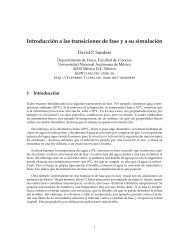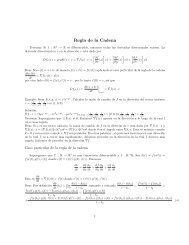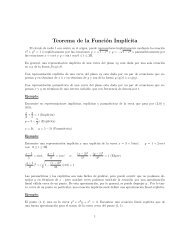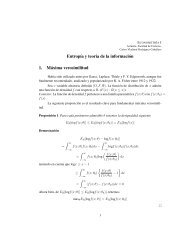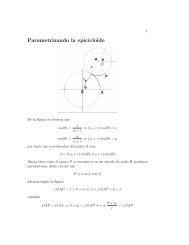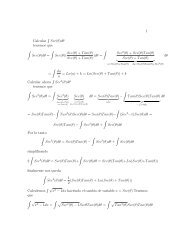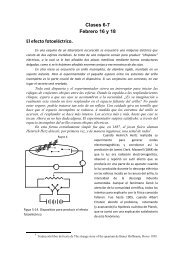"Surely You're Joking, Mr. Feynman!" - unam.
"Surely You're Joking, Mr. Feynman!" - unam.
"Surely You're Joking, Mr. Feynman!" - unam.
You also want an ePaper? Increase the reach of your titles
YUMPU automatically turns print PDFs into web optimized ePapers that Google loves.
He was completely washed out, and left, humiliated. The waiters congratulated<br />
each other.<br />
How did the customer beat the abacus? The number was 1729.03. I happened to<br />
know that a cubic foot contains 1728 cubic inches, so the answer is a tiny bit more than<br />
12. The excess, 1.03, is only one part in nearly 2000, and I had learned in calculus that<br />
for small fractions, the cube root's excess is onethird of the number's excess. So all I had<br />
to do is find the fraction 1/1728, and multiply by 4 (divide by 3 and multiply by 12). So I<br />
was able to pull out a whole lot of digits that way.<br />
A few weeks later the man came into the cocktail lounge of the hotel I was<br />
staying at. He recognized me and came over. "Tell me," he said, "how were you able to<br />
do that cuberoot problem so fast?"<br />
I started to explain that it was an approximate method, and had to do with the<br />
percentage of error. "Suppose you had given me 28. Now, the cube root of 27 is 3. . ."<br />
He picks up his abacus: zzzzzzzzzzzzzzz "Oh yes," he says.<br />
I realized something: he doesn't know numbers. With the abacus, you don't have<br />
to memorize a lot of arithmetic combinations; all you have to do is learn how to push the<br />
little beads up and down. You don't have to memorize 9 + 7 = 16; you just know that<br />
when you add 9 you push a ten's bead up and pull a one's bead down. So we're slower at<br />
basic arithmetic, but we know numbers.<br />
Furthermore, the whole idea of an approximate method was beyond him, even<br />
though a cube root often cannot be computed exactly by any method. So I never could<br />
teach him how I did cube roots or explain how lucky I was that he happened to choose<br />
1729.03.<br />
O Americana, Outra Vez!<br />
One time I picked up a hitchhiker who told me how interesting South America<br />
was, and that I ought to go there. I complained that the language is different, but he said<br />
just go ahead and learn it it's no big problem. So I thought, that's a good idea: I'll go to<br />
South America.<br />
Cornell had some foreign language classes which followed a method used during<br />
the war, in which small groups of about ten students and one native speaker speak only<br />
the foreign language nothing else. Since I was a rather younglooking professor there at<br />
Cornell, I decided to take the class as if I were a regular student. And since I didn't know<br />
yet where I was going to end up in South America, I decided to take Spanish, because the<br />
great majority of the countries there speak Spanish.<br />
So when it was time to register for the class, we were standing outside, ready to<br />
go into the classroom, when this pneumatic blonde came along. You know how once in a<br />
while you get this feeling, WOW? She looked terrific. I said to myself, "Maybe she's<br />
going to be in the Spanish class that'll be great!" But no, she walked into the<br />
Portuguese class. So I figured, What the hell I might as well learn Portuguese.<br />
I started walking right after her when this AngloSaxon attitude that I have said,<br />
"No, that's not a good reason to decide which language to speak." So I went back and<br />
signed up for the Spanish class, to my utter regret.<br />
Some time later I was at a Physics Society meeting in New York, and I found



